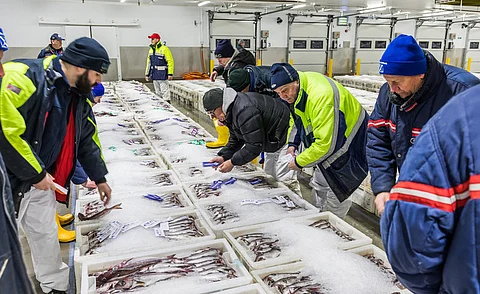

The Seafood Carbon Emissions Profiling Tool (SCEPT) calculates carbon footprints for wild capture and aquaculture seafood products.
Seafish
The Seafood Carbon Emissions Profiling Tool (SCEPT), developed by UK seafood trade organization Seafish to assist seafood businesses in measuring and reducing their carbon footprints, is beginning to see adoption across the sector.
The tool, launched earlier this year, calculates carbon footprints for wild capture and aquaculture seafood products, helping companies identify emissions hotspots and align with the UK’s 2050 net-zero targets.
Seafish has announced that several prominent seafood companies, including Hilton Foods, New England Seafood International (NESI), and Arctic Traders, have started integrating the tool into their operations to improve their environmental impact assessments.
Hilton Foods, which supplies seafood to international retailers and food service brands, is using the tool to understand the carbon footprint of products like basa fillets, the company said. Meanwhile, New England Seafood International (NESI), which has committed to net-zero emissions by 2050, says it has used the tool to identify greenhouse gas emissions across its sites and supply chains, and said it plans to integrate the tool into the company’s data collection processes to guide its ongoing decarbonization efforts.
Arctic Traders, specializing in seafood procurement for processors, retailers and food service, said it is using the tool to compare carbon emissions from different transportation methods, such as road and sea freight for shipping seabass from Turkey.
"We are proud to have collaborated with Seafish to develop the Seafood Carbon Emissions Profiling Tool which has transformed how we at Hilton Foods assess and manage our seafood environmental impact," said Emer Fardy, Group Sustainability & Human Rights Director at Hilton Foods, in a Seafish press release.
"This tool empowers us, our suppliers, and the wider industry to consistently measure carbon emissions calculations across the sector - a vital step toward achieving net zero. The tool exemplifies the kind of innovative collaboration needed to make real progress on sustainability by supporting a more efficient approach to reporting and creating more time for the actions that concretely reduce carbon emissions," Fardy added.
Dr Stuart McLanaghan, Head of Responsible Sourcing at Seafish, said the tool is intended to be "intuitive" and highlighted the organization has created a series of short tutorial videos to support users in utilizing the tool and interpreting the carbon footprint results.
"We’re confident that users can easily get started without the usual software learning curve and there is no need for prior technical expertise in LCA or carbon-footprinting," McLanaghan said.
"The tool’s integration across UK seafood supply chains is also essential to generate high-quality industry averaged datasets for benchmarking and public disclosure purposes. However, we are only at the end of the beginning. We will continue to evolve the tool to meet industry’s needs and aspirations, and to integrate data reflecting latest scientific advances," he added.
